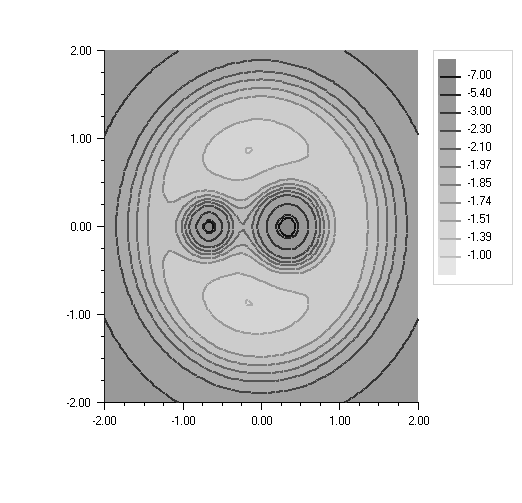In the center-of-mass coordinate system, the effective potential energy of the system is given by
using Imsl.Chart2D;
using System;
using System.Windows.Forms;
public class ContourEx1 : FrameChart
{
public ContourEx1()
{
Chart chart = this.Chart;
int nx = 80;
int ny = 80;
// Allocate space
double[] xGrid = new double[nx];
double[] yGrid = new double[ny];
double[,] zData = new double[nx,ny];
// Setup the grids points
for (int i = 0; i < nx; i++)
{
xGrid[i] = - 2 + 4.0 * i / (double) (nx - 1);
}
for (int j = 0; j < ny; j++)
{
yGrid[j] = - 2 + 4.0 * j / (double) (ny - 1);
}
// Evaluate the function at the grid points
for (int i = 0; i < nx; i++)
{
for (int j = 0; j < ny; j++)
{
double x = xGrid[i];
double y = yGrid[j];
double rm = 0.5;
double x1 = rm / (1.0 + rm);
double x2 = x1 - 1.0;
double d1 = System.Math.Sqrt((x - x1) * (x - x1) + y * y);
double d2 = System.Math.Sqrt((x - x2) * (x - x2) + y * y);
zData[i,j] = x2 / d1 - x1 / d2 - 0.5 * (x * x + y * y);
}
}
// Create the contour chart, with user-specified levels and a legend
AxisXY axis = new AxisXY(chart);
double[] cLevel = new double[]{-7, -5.4, -3, -2.3, -2.1, -1.97, -1.85,
-1.74, -1.51, -1.39, -1};
Contour c = new Contour(axis, xGrid, yGrid, zData, cLevel);
c.ContourLegend.IsVisible = true;
}
public static void Main(string[] argv)
{
System.Windows.Forms.Application.Run(new ContourEx1());
}
}
